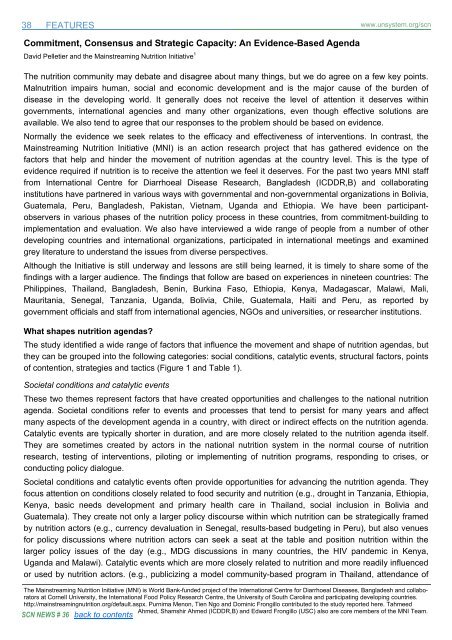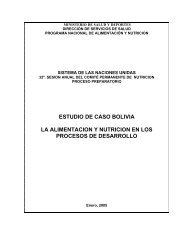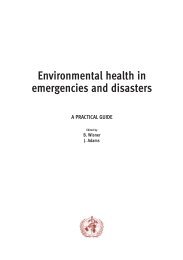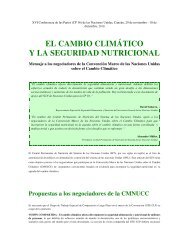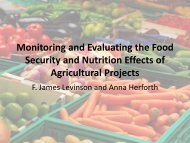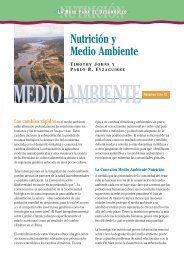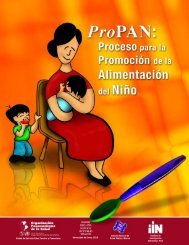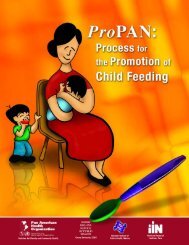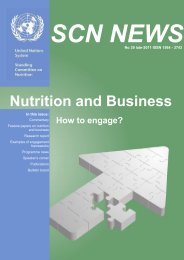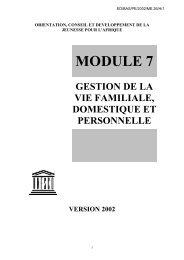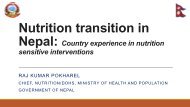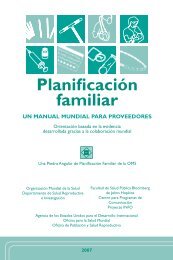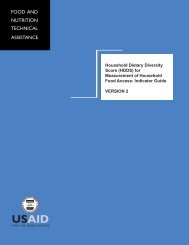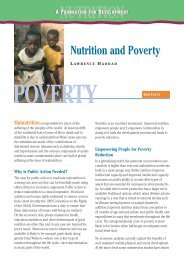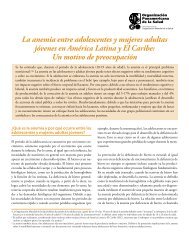SCN News No 36 - UNSCN
SCN News No 36 - UNSCN
SCN News No 36 - UNSCN
You also want an ePaper? Increase the reach of your titles
YUMPU automatically turns print PDFs into web optimized ePapers that Google loves.
38<br />
FEATURES<br />
www.unsystem.org/scn<br />
Commitment, Consensus and Strategic Capacity: An Evidence-Based Agenda<br />
David Pelletier and the Mainstreaming Nutrition Initiative 1<br />
The nutrition community may debate and disagree about many things, but we do agree on a few key points.<br />
Malnutrition impairs human, social and economic development and is the major cause of the burden of<br />
disease in the developing world. It generally does not receive the level of attention it deserves within<br />
governments, international agencies and many other organizations, even though effective solutions are<br />
available. We also tend to agree that our responses to the problem should be based on evidence.<br />
<strong>No</strong>rmally the evidence we seek relates to the efficacy and effectiveness of interventions. In contrast, the<br />
Mainstreaming Nutrition Initiative (MNI) is an action research project that has gathered evidence on the<br />
factors that help and hinder the movement of nutrition agendas at the country level. This is the type of<br />
evidence required if nutrition is to receive the attention we feel it deserves. For the past two years MNI staff<br />
from International Centre for Diarrhoeal Disease Research, Bangladesh (ICDDR,B) and collaborating<br />
institutions have partnered in various ways with governmental and non-governmental organizations in Bolivia,<br />
Guatemala, Peru, Bangladesh, Pakistan, Vietnam, Uganda and Ethiopia. We have been participantobservers<br />
in various phases of the nutrition policy process in these countries, from commitment-building to<br />
implementation and evaluation. We also have interviewed a wide range of people from a number of other<br />
developing countries and international organizations, participated in international meetings and examined<br />
grey literature to understand the issues from diverse perspectives.<br />
Although the Initiative is still underway and lessons are still being learned, it is timely to share some of the<br />
findings with a larger audience. The findings that follow are based on experiences in nineteen countries: The<br />
Philippines, Thailand, Bangladesh, Benin, Burkina Faso, Ethiopia, Kenya, Madagascar, Malawi, Mali,<br />
Mauritania, Senegal, Tanzania, Uganda, Bolivia, Chile, Guatemala, Haiti and Peru, as reported by<br />
government officials and staff from international agencies, NGOs and universities, or researcher institutions.<br />
What shapes nutrition agendas?<br />
The study identified a wide range of factors that influence the movement and shape of nutrition agendas, but<br />
they can be grouped into the following categories: social conditions, catalytic events, structural factors, points<br />
of contention, strategies and tactics (Figure 1 and Table 1).<br />
Societal conditions and catalytic events<br />
These two themes represent factors that have created opportunities and challenges to the national nutrition<br />
agenda. Societal conditions refer to events and processes that tend to persist for many years and affect<br />
many aspects of the development agenda in a country, with direct or indirect effects on the nutrition agenda.<br />
Catalytic events are typically shorter in duration, and are more closely related to the nutrition agenda itself.<br />
They are sometimes created by actors in the national nutrition system in the normal course of nutrition<br />
research, testing of interventions, piloting or implementing of nutrition programs, responding to crises, or<br />
conducting policy dialogue.<br />
Societal conditions and catalytic events often provide opportunities for advancing the nutrition agenda. They<br />
focus attention on conditions closely related to food security and nutrition (e.g., drought in Tanzania, Ethiopia,<br />
Kenya, basic needs development and primary health care in Thailand, social inclusion in Bolivia and<br />
Guatemala). They create not only a larger policy discourse within which nutrition can be strategically framed<br />
by nutrition actors (e.g., currency devaluation in Senegal, results-based budgeting in Peru), but also venues<br />
for policy discussions where nutrition actors can seek a seat at the table and position nutrition within the<br />
larger policy issues of the day (e.g., MDG discussions in many countries, the HIV pandemic in Kenya,<br />
Uganda and Malawi). Catalytic events which are more closely related to nutrition and more readily influenced<br />
or used by nutrition actors. (e.g., publicizing a model community-based program in Thailand, attendance of<br />
The Mainstreaming Nutrition Initiative (MNI) is World Bank-funded project of the International Centre for Diarrhoeal Diseases, Bangladesh and collaborators<br />
at Cornell University, the International Food Policy Research Centre, the University of South Carolina and participating developing countries.<br />
http://mainstreamingnutrition.org/default.aspx. Purnima Menon, Tien Ngo and Dominic Frongillo contributed to the study reported here. Tahmeed<br />
Ahmed, Shamshir Ahmed (ICDDR,B) and Edward Frongillo (USC) also are core members of the MNI Team.<br />
<strong>SCN</strong> NEWS # <strong>36</strong> back to contents


